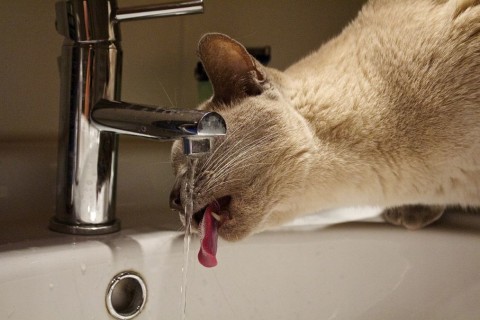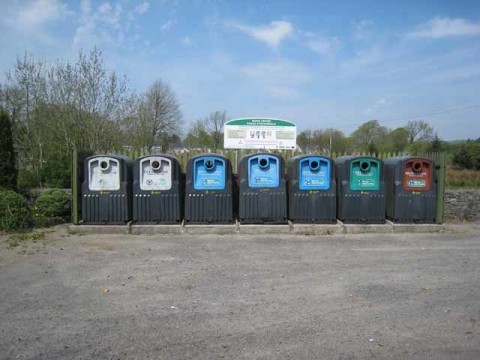This post may contain affiliate links. If you make a purchase through a link, I may receive a small commission, at no cost to you. These commissions help keep this website up and running, and I thank you for your support. Read my full disclosure here.
Once you have found a suitable place to live in, you need to set up your utilities. This guide provides an overview including, what’s available, and how to get them set up.
Tips- Utility bills are regularly required as proof of residence (e.g. applying for your PPS Number, library etc…), so always keep your most recent utility bill.
How to set up your utilities in Ireland:
- Gas and Electricity in Ireland
- Water in Ireland
- Household Waste Removal in Ireland
- Internet, Subscription TV, and Phone Services in Ireland
- Mobile Phone Services in Ireland
- Irish TV Licence
- Accessing Free TV in Ireland
Gas and Electricity in Ireland

Some modern homes may have solar panels installed. Some properties may have access to gas, but electricity is typically the main source of energy in Ireland. Both are quite expensive. Flats typically have pre-pay/pay as you go (PAYG) electricity set up in each flat, which means you pay for electricity before you use it. The standard billed method of paying for electricity is usually made bi-monthly or monthly, but a PAYG meter requires topping up before energy is used. That means when your credit runs out, so does your electricity, so you need to ensure that you keep it topped up for a continuous supply.
Standard voltage in Ireland is 230V AC. Electricity is charged by the unit used and there are two different rates – daytime and night time. The day time rate is much more expensive than the night time rate. Consequently, if you are relying on electricity for heating, night store heaters can be more efficient. If you are new to night store heaters, find out how to efficiently operate your night store heaters.
The electricity services are distributed and maintained by the state owned Electrical Supply Board (ESB), however, they are not an electricity supplier. In order to connect your electricity services, you will need to contact one of the electricity suppliers listed below and become a new customer. Along with your personal details, meter reading, and bank details (if paying by direct debit) you will need to supply them with your ESB supplied Meter Point Reference Number (MPRN). The MPRN is an 11 digit number that identifies your properties unique connection. Your landlord should be able to supply you with this number.
(Please note: The major suppliers usually remain constant, but the smaller suppliers come and go, often being bought out by the larger companies. Therefore this list is not always up to date.)
Irish Gas and Electricity Suppliers
Irish Electricity Only Suppliers
- Community Power – Ireland’s first community owned renewable electricity supplier.
- Ecopower – 100% green electricity
- Glow Power
- Waterpower
Irish Prepay Electricity Suppliers
Tips- Use price comparison websites such as Bonkers and Switcher to help you find the best and cheapest supplier to meet your individual needs.
- You can set up a new account with any of the energy suppliers online or over the phone.
Water in Ireland
The tap water in Ireland is safe to drink and is monitored by the local authorities to ensure a safe, quality supply. Irish Water is the only water supplier in Ireland. Universal water charges were introduced in 2014, to much opposition, and households began being billed for water in 2015. However, in April 2017 the charges came to an end. Now, households who use large amounts of water will have to pay the Household Water Conservation Charge for the excess water that they use. The charge will apply to a household’s usage of water above a specified threshold in accordance with the Water Services Act 2017. The threshold takes into account how many people live in the house. Owner occupiers and rental tenants will be liable to pay this charge. Landlords must either register with Irish Water or provide Irish Water with tenants’ details.

Household Waste Removal in Ireland
Rubbish collection (garbage/refuse) arrangements can vary from area to area, so check with your local authority. Usually it is a private contractor providing the waste services. A new framework for household waste charges was announced in June 2017. Under these arrangements, waste collectors can offer a range of pricing options such as; standing charges; charges per lift or per kilo; charges by weight band; weight allowance charges; or combinations of these elements. If you are living in an apartment complex, then waste is usually included in your rent and they will provide bins for you to use. For those people who have lifelong or long-term medical incontinence, an annual support payment is available.
Waste providers often use wheelie bins to collect the waste but some may provide an option to use bin bags. You will need to attach a pre-paid tag to each bag and of it it’s not tagged, it won’t be collected. You can generally buy tags from local shops, garages etc. Rubbish and recycling is separated and your provider will tell you what goes into each bin. Containers need to be clean and glass needs to be recycled separately (don’t forget to remove the lid, as it’s not glass). Bins are colour coded so you know what waste to put in which bin. The most common bin colour codes are: brown for garden waste, food waste and other compostable waste; green for recyclable items; and black or grey for residual waste. Rubbish collection usually occurs once a week, but the day will depend on the area you live in. Some operators may collect different types of waste on different weeks.
To reduce your waste expenses, separate the recycling from the rubbish and take it to one of the free public recycling centres in your local area. Find your nearest recycling centre here. In general there is no charge at these recycling centres but it can be very inconvenient to have to store your recyclables and then take them to these bins, especially if you don’t own a car. There are also landfill sites, but they charge fees.
Before sending your waste to the landfill, first consider whether it could be reused by someone else. Websites such as Trash Nothing Ireland enable you to offer your unwanted items to people so they can be reused or repurposed. These websites are also great if you are on a budget and looking to furnish your home, or are looking for upcycle project.

Internet, Subscription TV and Phone Services in Ireland
There are a number of types of internet services available in Ireland:
ADSL: Also known as broadband, this internet service is brought to you via the landline phone lines. Hence you will need to have a phone line installed and pay for line rental. Ireland is rolling out its Fibre Broadband network which will deliver greater internet speed.
Cable/Fibre: Cable/Fibre uses fibre-optic cables and is only available in select areas around Ireland. The fastest type of fibre connection is Fibre-to-the-Home, but Part Fibre (Fibre-to-the-Cabinet) is more common and can still offer decent connection speeds. It may be more expensive than ADSL broadband, but prices are becoming more competitive as more providers are now offering this service. However, before taking out a contract check the speeds that the provider is offering as they can vary between providers.
Fixed Wireless Broadband: Fixed wireless broadband is an alternative to customers in rural areas where ADSL or cable is not available. A small transmitter in your local area broadcasts wireless signals that are picked up by a small antenna on your house, which channels the signal to a router or connection point inside the house.
Satellite Broadband: Satellite is an option for those living in remote parts of Ireland with no cable, ADSL, fixed wireless or even mobile broadband service. The signal that comes through a satellite dish so the quality of the connection is more likely to be affected by adverse weather conditions and it is expensive to install. Before taking out a contract check for download caps.
Mobile Broadband: Mobile broadband allows you to access the internet via the networks operated by mobile operators. As well as getting mobile broadband through your phone, you can also use this type of internet through either a USB dongle or modem plugged into your PC, laptop or mobile device, or using a WiFi Hotspot Device. Before taking out a contract, check the data allowance being offered, as there are usually steep charges for going over this.
Combined Broadband Internet, Subscription TV, and Phone Bundles
If you want to access subscription pay TV, broadband internet, and landline phone services, then bundles can offer the best value for money and the ease of only having one monthly bill. However, be wary of price specials that offer a great introductory rate but then increase after a short period of time. Some of these deals are good value, but others could actually cost you more in the long run.
Providers:
Broadband Internet and Phone Bundles
Combined broadband and phone bundles are available for those of you who don’t want to pay for subscription TV. To get broadband services, you need to have a landline phone connection, so the deals usually include competitive call rates as well. If your phone line is not connected, your new provider can arrange to get this done.
Be wary of price specials that offer a great introductory rate but then increase after a short period of time. Some of these deals are good value, but others could actually cost you more in the long run. You should also consider and compare the internet speeds. Fibre is available in many areas. Your supplier of choice will be able to advise you if you can access it.
Satellite Internet Providers
For those living in remote areas, there are also satellite broadband suppliers.
Subscription Pay TV Service Providers
If you only want subscription TV services, Virgin Media and Sky offer a stand alone subscription TV service. Netflix is also available in Ireland.
Mobile Broadband
You can access mobile broadband services via a stick/dongle device or using a WiFi Hotspot Device.
Stick/Dongle: There are a number of companies that can provide you a stick/dongle style internet connection for your computer. Alternately, you could also get a mobile phone plan that includes data and connect your phone to your computer to access the internet. The data plans for dongles and mobile phones can be quite limited, but shop around as there are some good deals to be had.
Tethering: You can use your mobile phone internet plan by connecting your phone to your device using its USB charger cord. You typically need to go into your mobile phone settings and select tethering.
WiFi Hotspot Device: WiFi hotspot devices are great because you can use them either plugged into your device or via Wifi. They can also provide a Wifi connection to more than one device at a time. There are lots of great deals, some even offering large data packages for the same price as a broadband service. Better yet, there is no waiting for it to be connected and you don’t even need a phone connection. These devices are a good option for those living in flats or shared houses and need their own private internet connection. The provider that you purchase it from should be able to tell you whether or not your area has good coverage. They should also provide you with a guarantee that you can return the device if it does not work in the area you live.

Mobile Phone Services in Ireland
There are a number of mobile phone providers in Ireland:
There are several types of mobile phone services available to customers:
- Prepay – you need an unlocked SIM phone for prepay to work.
- Pay as you go – be careful with this option, as you may end up spending more money than you would on a prepay plan.
- Phone contracts – it can be difficult to secure a phone contract if you have only just arrived in Ireland. A contract is also not a good option if you are only staying in Ireland for a short time, as you will likely incur a fee for breaking the contract.
- Sim only – these can be difficult to secure if you have only just arrived in Ireland.
It can be difficult to get on a mobile phone plan if you are new to Ireland, as they usually require you to have lived in Ireland for at least 6 months. However, this can depend on how ‘flexible’ the person signing you up is. You may also be able to get around this by paying a refundable deposit (usually after six months of service). If this is a problem, then you can just get a prepaid service in the meantime. In some cases, this may actually be the same price as a plan or even cheaper.
Before deciding on which is the best type of mobile phone service for you, consider:
- The network coverage they are offering – this may be an issue if you are living in a more remote area of Ireland.
- How much calls, text, and data you typically use each month to establish the best type of phone service for your individual needs.
- How much you can comfortably afford each month.
- Whether you need a new phone or can use your existing phone.
- How much you travel – you may need to consider a dual sim phone and roaming. If you are travelling within the EU, then you don’t have to pay any additional charges to use your mobile phone in another EU country. This is known as “roaming” or “roam like at home”. Your calls to mobile and fixed phones, SMS, and data services are charged at domestic rates, i.e. the same price as calls, texts and data within your home country. The same rule also applies to any calls or text messages you receive while you’re abroad – you aren’t charged extra to receive calls or texts while roaming, even if the person calling you is using a different service provider. Learn more about roaming in the EU.
- Whether you need phone insurance for damage and loss. Sellers tend to push insurance products onto customers when they purchase new phones. Weigh up whether it is worth the additional expense.
Tips
- Use price comparison websites such as Bonkers and Switcher to help you find the best and cheapest deal to meet your individual needs.
Irish TV Licence
In Ireland, any home with a TV is expected to pay an annual TV licence. The bulk of this fee goes towards funding the free Irish TV, RTÉ. Even if you don’t watch RTÉ, you are still are still required to pay for this licence if you own a TV or equipment capable of receiving a television signal. The Irish TV licence is managed by An Post, the Irish Postal Service. Be aware that failure to pay your TV licence can lead to a fine and a court conviction.
- Learn more about the TV licence.
Accessing Free TV in Ireland
I found the entire TV system in Ireland quite confusing. The free Irish TV is quite limited and has only a handful of channels. The other option is paid TV, but if you are on a tight budget, this can be expensive. However, you can get more free TV channels by accessing the UK’s free TV. I have outlined below how you can gain access to both of these free TV options.

How to Access the Free Irish TV
Raidió Teilifís Éireann (RTÉ) is the National Public Broadcaster for Ireland. They produce programmes and broadcast them on television, radio and the Internet. RTÉ channels also show mainstream TV shows from around the world and their website provides an RTÉ Player service which enables you to catch up on shows that you have missed.
Ireland no longer broadcasts analogue TV as it has been replaced with a digital signal. The free digital service that provides this RTÉ broadcast is called Saorview, which it is owned and managed by RTÉ. If you have an HD TV, you can simply receive the digital Saorview broadcast by connecting it to a TV aerial or rabbit ears. If you have an old TV that is not capable of digital TV, then you will need to purchase a Soarview Set Top Box.
How to Access the Free UK Channels in Ireland
With the right equipment, you can also access the UK’s free digital television service.
What is Free to Air, Freesat and Freeview?
You may hear these terms bandied around, but most people don’t understand the difference. These services all play the same free UK channels; however they use a different type of receiver.
Free-to-Air: Is the free UK TV channels that can be received using an ITV/BBC patented satellite receiver and a satellite dish. (See option 1 and 2 below).
Freesat: Is the free UK TV channels that can be received using a generic satellite receiver and a satellite dish. (See option 3 and 4 below).
Freeview: This broadcast can be accessed via a TV aerial, but only in a few Irish coastal locations (and only if you have the aerial in the right spot).
Option 1: How to Access UK Free to Air Using an Old TV That Cannot Receive a Digital Signal
If you have an old TV that does not receive digital TV, then you can purchase a Saorview Combi Set Top Box (note: this is different to the Saorview Set Top Box as discussed above). This will enable you to receive both the Free to Air UK channels and the digital Saorview RTÉ channels. However, in order to access the Free to Air UK channels, it needs to be used in conjunction with a satellite dish.
Option 2: How to Access UK Free to Air Using a HD TV
You can use your normal TV aerial or rabbit ears to access the free Irish TV through the digital Saorview service.
To get the free UK channels, you need to purchase a Free to Air satellite receiver. It needs to be used in conjunction with a satellite dish. These two items can be bought together as a package.
Option 3: How to Access UK Freesat Using a HD TV
You can use your normal TV aerial or rabbit ears to access the free Irish TV through the free digital Saorview service.
To get the free UK channels, you need to purchase a Freesat box satellite receiver. It needs to be used in conjunction with a satellite dish. These two items can be bought together as a package.
Option 4: How to Access UK Freesat Using a Skybox
If you end your subscription with Sky, or have an old Skybox lying around, you can use it as a Freesat box. You will also need to have a satellite dish set up to receive the signal.
Accessing Freesat using a Skybox or Skybox+
- Pull out your Sky card.
- Pull out the power lead.
- Wait a minute, then plug it back in and allow it to boot itself back up (this can take a few minutes).
- Go to your channels list and all the free UK TV channels should come up.
Accessing Freesat Using a Skybox+HD Box
These boxes are a little bit trickier. Sky must have caught on that people were using their old Sky boxes in this manner, because they have programmed it so that you cannot access the Channel 4’s, which broadcast many of the popular TV shows. To ‘unlock’ these channels, you will need to purchase a Freesat card, which are quite cheap. Unfortunately, these are not sold in Ireland, but if you know someone in the UK then get them to purchase one for you and post it over. If you don’t know anyone in the UK, then there are people selling them on second hand websites in Ireland. But be careful of buying it this way, as it comes with some risks. Just be sure to check with the seller that it works in a Skybox+HD and unlocks the Channel 4’s.
There are still some downsides – like you can’t set the order of the channels. But to get around this, you can use the ‘favourites’ function to store the channels that you like to watch and can access, so you don’t have to wade through the entire list of channels, which includes those that you can’t get. Be aware that you will also lose the functions that only Sky supports, such as the record feature, freeze and rewind and access to the hard drive.
Option 5: You Are Completely Confused and out of Your Depth
Don’t worry, there are lots of private TV services that can come out and install the equipment you need to access free UK TV in Ireland.
Recommendations/Disclaimer
I am not a TV professional. If you are going to try setting it up on your own then I definitely recommend that you discuss your needs with a professional. You need to ensure that you buy the right equipment, and there are pros and cons that need to be considered before deciding on whether to go with the Free to Air or the Freesat box.


James M
Excellent information for my planning phase. Thank you very much Colleen.
Patrick
Hi Colleen,
I wonder if you could guide me or at least give me the best advice based on your expert knoweledge please?
My wife and I are looking to rent a house ideally unfurnished in County Kerry and ideally along the coast, Ardfert/Ballybunion – we are struggling as there aren’t many properties generally for rent, however requesting property to be unfurnished is adding to our challenges.
We have tried, daft.ie/myhome.ie/rent.ie and there just isn’t anything about., so we wondered if there are other websites that maybe we haven’t heard of or if indeed we could use a platform to advertise that we are looking for a rental house.
Any ideas/suggestion will be greatly received.
Thank you,
Pat
Colleen
Hi Patrick, some other ideas that might be worth trying is to look online for local community forums (e.g. Facebook Marketplace, Gumtree, local church groups etc..) and to post your request for accommodation there as well see if you can make any direct contact with people that are advertising their rentals on these forums. However, please be aware that there are a lot of scammers out there so don’t give anyone any money until you have seen the property in person and completed a contract with them.
Ryan Poole
My Names Ryan Poole I live in California US life here is getting Very bad in the US very unstable and I’m looking. To move to Ireland. I am going to welding school here in the US will be moving to Ireland in my 30s im 26 now so I’m trying to save up I can’t live here anymore And the US people I can’t stand very rude and arrogant violence is Disgusting here. I hope to move to somewhere outside of Dublin I will be visiting Ireland for the first time soon too. Not to mention this is the land of my ancestors Godbless you all
Kingsley
Hello
I just move to Dublin, Ireland and I rented accommodation but I was not given a contract, but I need prove of address to open a bank account and to apply for my ppsn, what should I do to get prove of address please and the land lord keep promising to help but have not done so
Please help me to know what to do.
Colleen
When you rent from a private landlord or an approved housing body, you have an agreement or contract with that person or body, known as a tenancy agreement – which may or may not be in writing. Personally I would never rent a property without a written contract, but that is your personal decision to make. They would need an official document that is sent to your home address, so you could ask your employer to send a work confirmation letter to your home address. Or if you have set up private health insurance and had documents sent to your home, they may also accept that. You will need to confirm with the authorities/organisations requesting the evidence as to what evidence they will accept.
Sandy
I have been living in Ireland for the last 5
Years and I have nothing but high praise for the country.
I am from the UK and live a very comfortable life there however, I cannot stop singing praises to Ireland and it’s people. I truly love you Ireland with all my heart.
Asher
Thank you for sharing! Very helpful.
I just moved to Ireland and our new apartment has gas and electricity. Do I have to set up both?
I am wondering which appliances use gas and which use electricity.
Asher
Colleen
Hi Asher, yes typically you would need to set up both, but double check the arrangements for your apartment with your rental agent.
Andrea Elizabeth Foster
Hi, I am also moving to Ireland, cork for work. I’ve emailed around 30/40 houses on mitula and daft and not one reply? Should I be looking elsewhere? I’ve also registered with 2 different estate agents and nothing from them either? I understand the current situation, but also a little confused? Can anybody help?
Thanks
Andrea.
K Doolin
Hello, we may be considering moving to Ireland as we have ancestry roots there. We would like to move into a rental first. What is your favorite place to live in Ireland and why.
Shambles of a country
Beware of moving to Ireland – most rip-off country in Europe! Appalling services, worst health service (and most expensive) in Europe, elderly people treated appallingly lying on hospital trolleys for days (90 year olds left in these conditions), not to speak of the waiting lists for YEARS for serious conditions (children’s health and treatments for the elderly). Many hospitals have been closed down, and in Ireland they have mixed genders in wards, so people are left without any sense of dignity while being at their most vulnerable in hospital wards. Many elderly men and women choose to leave early the hospital ward, because they are humiliated by having nurses discuss in a loud voice their issues in wards where males and females are beside them in beds (that’s IF they manage to get a bed having been left on a trolley in corridor for days). Then there is the question of sexual assaults taking place in mixed hospital wards – again, no accountability, and pushed under the carpet.
Then there is a housing crisis which is out of control and, as always in Ireland, rents are rip-off scams, with private landlords charging 3 times the price of housing in Europe.
Suicides are consistently high in Ireland, (referred to as “personal tragedy” when person after person throws themselves from bridges or under trains, but never announced as “suicide”, as government wants to pretend that all is well and “thriving” in Ireland), and violence, gang feuds, anti-social behaviour and massive poverty are now the norm in all cities, ignored utterly by corrupt government which sells the lie that Ireland is “in recovery”.
Be warned: you will be ripped-off for everything once you try to set up home in Ireland. Don’t buy the tourist marketing – it’s all waffle.
Jamie Cullen
Do me a favour mate and sod off, we’re not perfect but neither is any country in Europe.
Jess van Vuuren
Try living in South Africa!! We have REAL problems here!!
There is SO much to be grateful for in Ireland. If you don’t like Ireland, then move, but remember that even if the grass looks greener, it’s probably because there’s more s.h*t.e. Nowhere is perfect.
Don’t use this website as the place to vent your personal frustrations. That’s what FB and other social media is for.
So inappropriate.
Colleen: you’ve done SUCH a wonderful job with this website, & I for one am SO grateful to have found it. Thank you for your hard work & all the detailed information. Maybe consider taking down this drivel of a thread…
Colleen
Thanks Jess van Vuuren, I was in two minds about removing the comment since I appreciate that everyone has different experiences of Ireland and didn’t want to look like I was just choosing the positive comments only. All countries have their good and bad points and their problems, but in further support to your comment, in comparison to many other countries Ireland is a safe and prosperous country. I think it would be good for people to visit these kind of countries so they can truly appreciate what they have.
Dave
Thank you so much for this more than helpful article, i will be moving to Ireland soon and this has really helped me in my preparation for my move.
Kind regards
Dave
Colleen
Thanks Dave, good luck with the move.